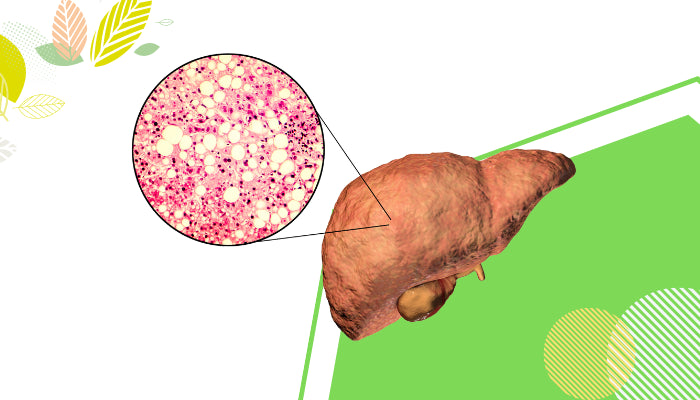Your Cart is Empty

লিভার মানব দেহের বৃহত্তম অভ্যন্তরীণ অঙ্গ, যা পেটের উপরের-ডান দিকে অবস্থিত। এটি আপনার শরীরকে খাদ্য হজম করতে, শক্তি সঞ্চয় করতে এবং টক্সিন অপসারণ করতে সাহায্য করে। পাচনতন্ত্র থেকে রক্ত শরীরের অন্য কোথাও ভ্রমণ করার আগে লিভারের মাধ্যমে ফিল্টার করে।
ফ্যাটি লিভার ডিজিজ হল লিভারের কোষে অতিরিক্ত চর্বি জমা হওয়া এবং এটি একটি সাধারণ লিভারের অভিযোগ। লিভারে কিছু চর্বি থাকা স্বাভাবিক, তবে যদি চর্বি লিভারের ওজনের 5 শতাংশের বেশি হয়, তবে এটি গুরুতর জটিলতা সৃষ্টি করতে পারে।
অতিরিক্ত চর্বি লিভারের টিস্যুর ক্ষতি করতে শুরু করে। এটি প্রদাহ সৃষ্টি করে এবং ব্যথা সৃষ্টি করে। যদি ফ্যাটি লিভারের লক্ষণগুলি আগে শনাক্ত করা হয় তবে সেগুলি বিপরীত হতে পারে।
তাই আমাদের অবশ্যই ফ্যাটি লিভারের লক্ষণগুলি সনাক্ত করতে হবে। এবং আমরা সাহায্য করতে এখানে আছি!
এই ব্লগে, আপনি সমস্ত ফ্যাটি লিভারের লক্ষণ এবং সম্ভাব্য প্রতিকারগুলি সনাক্ত করতে শিখবেন! তাই পড়তে থাকুন!
দুটি প্রধান প্রকার আছে:
নন-অ্যালকোহলিক ফ্যাটি লিভার ডিজিজ (NAFLD) যারা অ্যালকোহল পান করেন না তাদের লিভারে অত্যধিক চর্বি জমা হওয়ার কারণে সৃষ্ট পরিস্থিতির একটি পরিসীমা বর্ণনা করে।
নন-অ্যালকোহলিক ফ্যাটি লিভার ডিজিজ (এনএএফএলডি) এর পরিপ্রেক্ষিতে, যখন লিভারে চর্বি জমা হতে শুরু করে, জটিলতা শনাক্ত করার জন্য পুরো প্রক্রিয়াটিকে চারটি ধাপে ভাগ করা হয়।
প্রতিটি পর্যায়ের নিজস্ব অসুবিধা আছে এবং শেষ পর্যায়টি বেশ অপরিবর্তনীয়। তাই খুব দেরি হওয়ার আগে স্টেজটি চিহ্নিত করা গুরুত্বপূর্ণ।
এখানে আমরা চারটি ধাপই সংক্ষেপে ব্যাখ্যা করেছি-
এটি একটি সাধারণ ফ্যাটি লিভার এবং কোন উপসর্গ চাপিয়ে দেয় না। সাধারণত, সময়ের সাথে সাথে চর্বি তৈরি হয় এবং পরবর্তী পর্যায়ে বিকশিত হয় না।
মাত্র 20% লোক পরবর্তী পর্যায়ে যায়।
বেশিরভাগ লোক এই পর্যায়ে তাদের লিভারে প্রদাহ অনুভব করবে। এটি মূলত যখন লিভার তার ক্ষতিগ্রস্ত টিস্যুগুলি মেরামত করার চেষ্টা করে, এটি একটি জ্বলন্ত সংবেদন তৈরি করে।
যখন আরও টিস্যু ক্ষতিগ্রস্ত হয়, তখন স্ফীত টিস্যু দাগ তৈরি করে এবং এটি পরবর্তী পর্যায়ে বিকশিত হয়।
এটি ঘটে যখন যকৃতে এবং লিভারের চারপাশে রক্তনালীতে ক্রমাগত দাগ থাকে। লিভার এখনও এই পর্যায়ে বেশ ভালভাবে কাজ করতে পারে, এবং প্রদাহের কারণ অপসারণ বা চিকিত্সা করা আরও অগ্রগতি রোধ করতে পারে বা এমনকি কিছু ক্ষতি বিপরীত হতে পারে। যাইহোক, সময়ের সাথে সাথে, যদি দাগের টিস্যু লিভারের অনেক সাধারণ টিস্যু প্রতিস্থাপন করতে শুরু করে তবে লিভারের কার্যকারিতা প্রভাবিত হয়। এর ফলে সিরোসিস হতে পারে।
এটি চূড়ান্ত পর্যায় এবং লিভার এখানে কাজ করা বন্ধ করে দেয়। এই পর্যায়ে বেশিরভাগ উপসর্গ দেখা দেয় যেমন ত্বক হলুদ হয়ে যাওয়া এবং চোখের সাদা অংশ এবং পাঁজরের নিচের ডানদিকে একটি নিস্তেজ ব্যথা। দাগ টিস্যু অপসারণ করা কঠিন হয়ে পড়ে। সিরোসিসের কোনো বর্তমান চিকিৎসা নেই, তবে ওষুধগুলি সমস্যা কমাতে সাহায্য করতে পারে।
এনএএফএলডি-এর সমস্ত ধাপই হার্ট অ্যাটাক এবং স্ট্রোকের মতো কার্ডিওভাসকুলার রোগ হওয়ার ঝুঁকির সঙ্গে যুক্ত।
অ্যালকোহলিক ফ্যাটি লিভার ডিজিজ বেশি অ্যালকোহল ব্যবহারের কারণে হয়। আপনি যে অ্যালকোহল পান করেন তার বেশিরভাগই আপনার লিভার ভেঙে ফেলে, তাই এটি আপনার শরীর থেকে সরানো যেতে পারে। কিন্তু এটি ভেঙে ফেলার প্রক্রিয়া ক্ষতিকারক পদার্থ তৈরি করতে পারে। এই পদার্থগুলি লিভারের কোষগুলিকে ক্ষতি করতে পারে, প্রদাহকে উন্নীত করতে পারে এবং আপনার শরীরের প্রাকৃতিক প্রতিরক্ষাকে দুর্বল করতে পারে। পরবর্তী ধাপগুলি হল অ্যালকোহলযুক্ত হেপাটাইটিস এবং সিরোসিস।
ফ্যাটি লিভার রোগের কারণগুলি শেখাও এই অবস্থা প্রতিরোধ করতে সাহায্য করতে পারে! তাই এখানে চর্বি জমে যকৃতের সাধারণ কারণগুলি-
ফ্যাটি লিভারের লক্ষণগুলি সাধারণত সিরোসিসের চূড়ান্ত পর্যায়ে দেখা যায় না। যাইহোক, কিছু উপসর্গ আছে যা লিভারে অতিরিক্ত চর্বি জমে শনাক্ত করতে সাহায্য করতে পারে।
ফ্যাটি লিভারের রোগগুলি যদি প্রাথমিক পর্যায়ে শনাক্ত করা যায় তবে তা বিপরীত হতে পারে। আপনার লিভারকে সুস্থ রাখতে আপনাকে স্বাস্থ্যকর ডায়েট রাখতে হবে, আরও ব্যায়াম করতে হবে এবং অ্যালকোহলকে না বলতে হবে।
একটি স্বাস্থ্যকর খাদ্যের জন্য, আপনার স্বাস্থ্যকর চর্বি এবং উদ্ভিদ-ভিত্তিক খাবার গ্রহণ করা উচিত। প্রতিদিন ভালো পরিমাণে শাকসবজি খান, কারণ সবুজ শাকসবজি চর্বি জমা হওয়া রোধ করতে সাহায্য করে। এছাড়াও ওমেগা-3 ফ্যাটি অ্যাসিড পেতে আপনার ডায়েটে মটরশুটি, সয়া এবং ফ্যাটি মাছ যেমন সালমন, টুনা ইত্যাদি যোগ করুন।
এছাড়াও আপনাকে ভাজা খাবার, চিনি বা লবণ সমৃদ্ধ খাবার এবং লাল মাংস খাওয়া বন্ধ করতে হবে। এছাড়াও, অবিলম্বে অ্যালকোহল গ্রহণ এবং ধূমপান ত্যাগ করুন।
এছাড়া নিয়মিত ব্যায়াম করুন। আপনার ওজন বেশি হলে আপনার লিভার বাঁচাতে ওজন কমাতে হবে।
যে খাবারগুলো ফ্যাটি লিভারের উপসর্গ কমাতে পারে,
হলুদ : গবেষকরা দেখিয়েছেন যে হলুদের ডেরাইভেটিভ কার্কিউমিন ফ্যাটি লিভারের রোগ কমায়।
অক্সিডেটিভ স্ট্রেসকে অ্যালকোহল, ওষুধ, ভাইরাল সংক্রমণ, পরিবেশ দূষণকারী এবং খাদ্যতালিকাগত উপাদান সহ বিভিন্ন এজেন্ট দ্বারা প্ররোচিত লিভারের ক্ষতির একটি মূল কারণ হিসাবে বিবেচনা করা হয়েছে । কারকিউমিন হল সবচেয়ে বেশি ব্যবহৃত দেশীয় অণুগুলির মধ্যে একটি যা যকৃতকে রক্ষা করে এমন বিভিন্ন সুরক্ষা কার্যকারিতা দ্বারা অনুপ্রাণিত। বৈজ্ঞানিক গবেষণায় দেখা গেছে যে কার্কিউমিন বিভিন্ন সেলুলার এবং আণবিক প্রক্রিয়ার মাধ্যমে অক্সিডেটিভ সম্পর্কিত যকৃতের রোগের উল্লেখযোগ্য প্রতিরক্ষামূলক এবং থেরাপিউটিক প্রভাব প্রয়োগ করে।
ফ্যাটি লিভারের লক্ষণগুলি সাধারণত প্রাথমিক পর্যায়ে দৃশ্যমান হয় না। যাইহোক, কিছু লক্ষণ আছে যা আমরা ব্লগে আলোচনা করেছি।
একটি সুস্থ লিভারের জন্য একটি ভাল খাদ্য এবং নিয়মিত ব্যায়াম রাখুন এবং এর ফলে, একটি সুস্থ জীবন!
উত্তর: হ্যাঁ, তবে সমস্যাটি হাতের বাইরে চলে গেলেই। ফ্যাটি লিভারের চারটি ধাপ রয়েছে এবং শেষ পর্যায়টি অপরিবর্তনীয়। এটি সামগ্রিক স্বাস্থ্যের ক্ষতি করতে পারে এবং ডায়াবেটিস, উচ্চ রক্তচাপ বা কিডনি ব্যর্থতার মতো আরও সমস্যা তৈরি করতে পারে।
উত্তর: যদি আপনার ফ্যাটি লিভারের লক্ষণ থাকে তবে আপনাকে যে কোনো মূল্যে অ্যালকোহল এড়িয়ে চলতে হবে। তাছাড়া মিষ্টি বা চিনি যুক্ত খাবার এড়িয়ে চলা উচিত। উপরন্তু, ভাজা খাবার, অতিরিক্ত লবণ, সাদা ময়দা, লাল মাংস ইত্যাদি আপনার খাদ্যের বাইরে থাকা উচিত।
পরবর্তী পড়ুন: আপনার লিভার ঠিকমতো কাজ না করলে কী হবে?
তথ্যসূত্র:
ফ্যাটি লিভার ডিজিজ: ঝুঁকির কারণ, লক্ষণ, প্রকার ও প্রতিরোধ (clevelandclinic.org)
নন-অ্যালকোহলিক ফ্যাটি লিভার ডিজিজ - লক্ষণ এবং কারণ - মায়ো ক্লিনিক
নন-অ্যালকোহলিক ফ্যাটি লিভার ডিজিজের চারটি ধাপ (NAFLD) (liverhealthuk.com)
মন্তব্য দেখানোর আগে অনুমোদিত হবে.